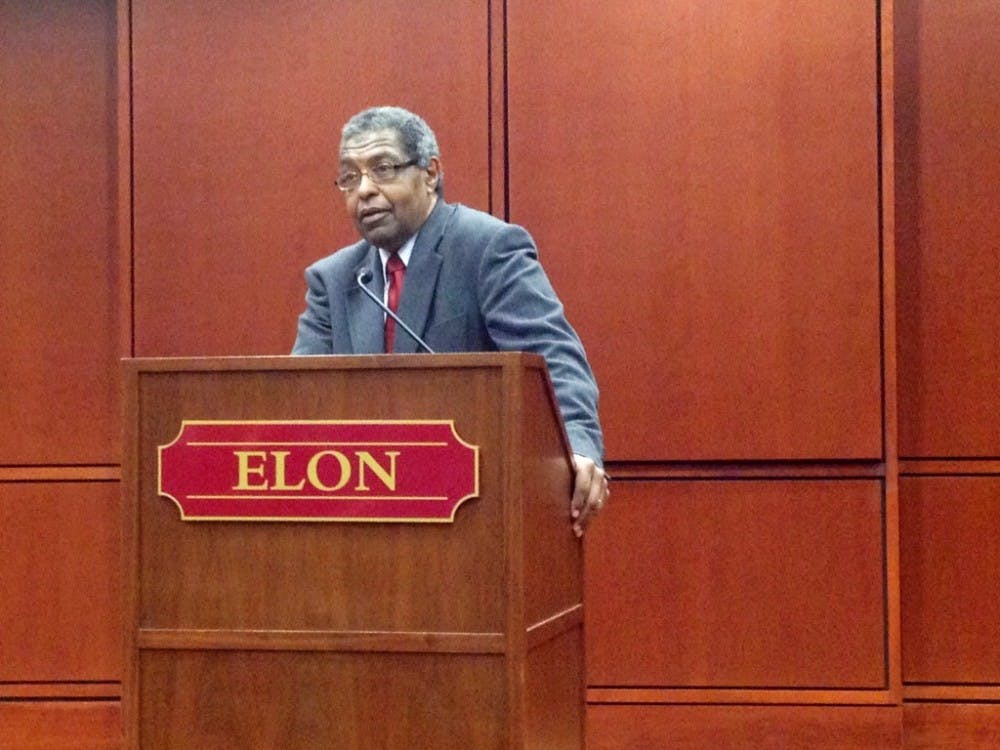As a part of the Martin Luther King, Jr. 50th Anniversary Speaker Series, William Darity, Jr. spoke about economic justice Wednesday at Elon. Darity serves as the chair of the African and African American Studies department at Duke University. His research focuses on economic inequality.
The talk focused on his plan to end unemployment and racially fueled wage discrimination.
“The United States is characterized by a long-standing pattern of large structural racial inequality that has deepened further as a result of the economic down-turn,” Darity said.
Despite the efforts of the Civil Rights Act of 1964, the unemployment gap and the racial gap have remained about the same nationwide.
The joblessness rate for black male teen high school dropouts is 95 percent, according to Remapping Debate, an advocacy group based in New York. African-Americans with some college education or an associate’s degree earn less than white high school dropouts, on average. Darity said he believes the racial gap in unemployment is a "profound index of the degree of discrimination in the U.S. labor market.”
Last year, Darity unveiled his plan to eliminate unemployment: The National Investment Corps. The Corps would work with state governments to create public works projects for unskilled workers. The jobs would pay at least $23,000 and provide an additional $10,000 in benefits.
Job training and quality childcare are key features of the program. The plan was modeled after President Theodore Roosevelt’s Works Progress
Administration and the Civilian Conservation Corps.
Darity says if 15 million people enrolled in the program, and each worker was paid $50,000 a year, including benefits, the program would cost $750 billion annually.
Money to fund the program would come from cuts to the current $740 billion spent on poverty alleviation programs, which Darity says would become unnecessary once unemployment is eliminated.
The second part of Darity’s policy includes what he calls a substantial child development account, or the “Baby Bonds” proposal. This is a trust fund or endowment for each American child.
The amount of the fund depends on the family’s income, assets, debt, and other financial circumstances, with children of wealthier families receiving less money.
The amount allocated would be determined by the financial situation of the family three to five years before the birth of the child. The fund would incur interest at a constant rate of one percent annually until the child turns 18.
Darity says he believes this will lessen the inequality gap between children who are born into wealthy families and those who grow up in poverty. The average account would be worth $20,000. Families who fall below the poverty line, such as a family of four earning less than $23,550 a year, could receive a Baby Bond worth up to $50,000. Funds could be used for business ventures, education, the purchase of a home or other approved expenditures.
Darity estimates the program would cost $80 billion annually, which he says is “not very much in the context of the American budget.”
Some students and faculty present were not convinced that Darity’s proposal is the solution to the racial wealth gap.
“I have very mixed feelings about Darity’s ideas. I would love knowing I could secure a job, as I think many people would, but this project is too big of a jump. Secondly, there are too many problems that Darity did not have solutions for, which I really felt weakened his point,” said freshman Riley Billman.
Darity has presented his plans for a National Investment Corps and Baby Bonds to the Obama administration, but the administration has not picked up either program as of yet. While Darity acknowledges that the program would not provide better education, housing, healthcare or opportunities for the children while they are growing up, he believes it could be transformative for low-income Americans.
“The provision of a substantial trust fund for newborns for families that are wealth poor and the passage of a federal job guarantee would go a long way towards achieving what the American ideal should be,” Darity said.


